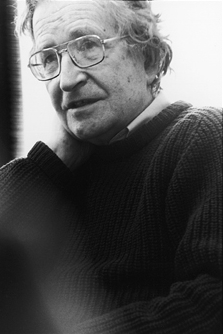The bewildered herd
Noam Chomsky’s recent piece in the Belfast Telegraph contained a fragment of a quotation from Walter Lippmann. It’s useful, because it helps to show how the ruling elites actually view the public: namely, not as a group of participants with legitimate concerns and ideas to offer, but rather as so much cattle that need to be prodded into going along with their betters.

Noting that public opinion and government action are today often at odds with each another, Chomsky explains that for the power elites in our so-called capitalist democracies public opinion is something to affect, something to change via public relations, not something to follow. The governments of modern Western nation-states see the public as “meddlesome outsiders.” This term echoes Lippmann in The Phantom Public:
With the substance of the problem it [the public] can do nothing usually but meddle ignorantly or tyrannically. It has no need to meddle with it. Men in their active relation to affairs have to deal with the substance, but in that indirect relationship when they can act only through uttering praise or blame, making black crosses on white paper, they have done enough, they have done all they can do if they help to make it possible for the reason of other men to assert itself.
For when public opinion attempts to govern directly it is either a failure or a tyranny. It is not able to master the problem intellectually, nor to deal with it except by wholesale impact. (p. 60, The Phantom Public, emphasis mine)
For Lippmann and indeed for today’s policy makers, following the will of the public is a folly that would end in “failure or tyranny.” And so:
The public must be put in its place, so that it may exercise its own powers, but no less and perhaps even more, so that each of us may live free of the trampling and the roar of a bewildered herd. (p. 145, The Phantom Public, emphasis mine)
Our spectator democracies
That herd, Chomsky tells us, needs to understand its proper function.
They’re supposed to lend their weight every few years, to a choice among the responsible men. But apart from that, their function is to be “spectators, not participants in action” – and it’s for their own good. Because as the founder of liberal political science pointed out, we should not succumb to “democratic dogmatisms about people being the best judges of their own interest”. They’re not. We’re [viz., the ruling elite] the best judges, so it would be irresponsible to let them make choices just as it would be irresponsible to let a three-year-old run into the street. Attitudes and opinions therefore have to be controlled for the benefit of those you are controlling. It’s necessary to “regiment their minds”. It’s necessary also to discipline the institutions responsible for the “indoctrination of the young.” All quotes, incidentally. (emphasis mine)
For any libertarians or conservatives out there, please note that Chomsky has plenty of scathing words to say about the ineffectual parties on the left who, when in power, act exactly the same as conservatives. Public opinion is very much against austerity in Europe, but those destructive policies continue no matter which party is in power.
. . . economic policies have changed little in response to one electoral defeat after another. The left has replaced the right; the right has ousted the left.
Why does nothing change? Because the smarter class, the intelligent minority, knows better than to follow public opinion. “No man can serve two masters,” and we know who the real master is. As John Jay put it:
. . . the mass of men are neither wise nor good—those who own the country ought to govern it.
Wanted: fans not friends, spectators not participants
As it is with politics, so it is with academia, especially in that extremely rarefied realm of Biblical Studies. If you didn’t catch the undertone in the blog posts Neil quoted from in his recent post on kicking Atwill to the curb, let me remind you. Atwill’s theories on Christian origins are pretty far out there. In fact, they’re so far out there that they’re rather easy to debunk on their own merits. Yet that wasn’t enough, was it? We had to be reminded that he didn’t have the proper credentials.
Continue reading “Protecting Our Institutions from “Meddlesome Outsiders””
